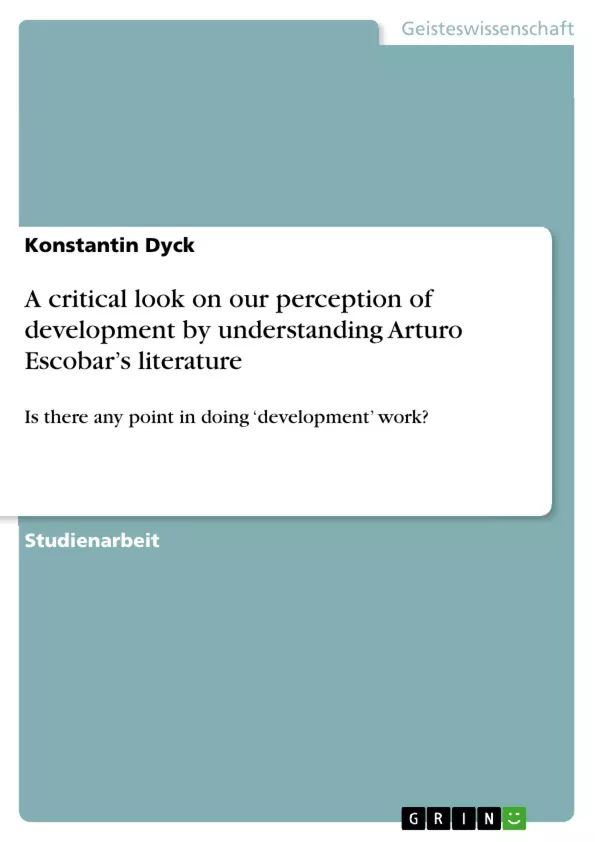Once I started to reflect the course “Anthropology and Development”, it was quite sure that I would choose one critical and mind-opening article as a base for my work. The works of Arturo Escobar a Columbian anthropologist came into my head. I really appreciated his interdisciplinary methods. During our class, his concepts were the one that polarized the most and lead to vivid discussions. He took discursive analysis out off sociology and philosophy and completed a very sophisticated breakdown of our most essential perception of what we called “development”. His ideas covered enormous fields starting from malnutrition up to women rights. Most points about development I took before my readings for granted and never scrutinized it. Similar to debunking the term “Orient” in Edward Said’s work “Orientalism”, Escobar questions our notion of “development” and calls it a product of the western world. Going through lots of his texts Arturo Escobar reveals his points with a clear language and made it a good read for me. What he really emphasizes repeatedly is that the uses of terms like “Third World”, “underdeveloped” and “poor” have to be reconsidered on a big scale. It is not about criticizing one point after the other. It is a highly challenging work for every reader to leave so much concepts behind which were naturally built in our language and thoughts. His major work “Encountering Development: The Making and Unmaking of the Third World” summarizes plenty of his earlier works published in magazines like “Development or “Future” in the 1990s. Although sometimes reviewed as too much based on generalizations it is interesting how my view on lots of political, economical and cultural topics was not only changed but also completely flipped inside out. Even if you do not agree with Arturo Escobar on every point or fail to follow on his side-trips into other topics, there remains at least a small impact in your perceptions of your surroundings, whether it is to a positive or a not so good direction. I definitely see so much potential in Escobar’s work not only for anthropology and development itself but also most notably for presenting the discursive methods on a broader scale. Much of his presented improvements or alternatives are already working today for several regional and international campaign and organizations. It is fascinating how his ideas never lost any topicality until now.
Inhaltsverzeichnis
- Introduction
- A historical view on "development"
- Postwar Transformations
- Development as a Doctrine
- Deconstructing "development"
- Development as a Western Construct
- The Illusion of Progress
- Pluriverse instead of universe or local social movements...
- Concluding Remark
Zielsetzung und Themenschwerpunkte
Die Arbeit befasst sich mit der kritischen Analyse des "Entwicklungs"diskurses, indem sie Arturo Escobars Werke heranzieht, um unsere Wahrnehmung von Entwicklung zu hinterfragen. Das Hauptziel ist es, die Konzepte von "Entwicklung" und "Dritte Welt" zu dekonstruieren und zu zeigen, wie diese von westlichen Perspektiven geprägt sind.
- Dekonstruktion des "Entwicklungs"diskurses
- Kritik an der westlichen Sichtweise auf Entwicklung
- Die Rolle von Machtstrukturen und Diskursiven Praktiken
- Alternativen zur dominanten Entwicklungslogik
- Bedeutung lokaler sozialer Bewegungen
Zusammenfassung der Kapitel
Das erste Kapitel stellt Arturo Escobars Werke und ihre Relevanz für die kritische Betrachtung des "Entwicklungs"diskurses vor. Es wird deutlich, dass Escobars Arbeiten eine intensive Auseinandersetzung mit der Entstehung und Wirkungsweise des Begriffs "Entwicklung" anregen. Das zweite Kapitel widmet sich der historischen Entwicklung des "Entwicklungs"diskurses. Es werden die Wurzeln dieser Denkweise im Kontext der Nachkriegszeit und der westlichen Hegemonie aufgezeigt. Insbesondere wird die Rolle von Institutionen wie der Weltbank und die Verbreitung des Modells der "industriellen Zivilisation" beleuchtet.
Schlüsselwörter
Die zentralen Themen der Arbeit sind Entwicklung, Entwicklungshilfe, Diskursive Praktiken, Dekonstruktion, Dritte Welt, Postkolonialismus, Arturo Escobar, Machtstrukturen, lokale soziale Bewegungen.
Häufig gestellte Fragen
Wer ist Arturo Escobar und was ist seine Hauptthese?
Escobar ist ein kolumbianischer Anthropologe, der argumentiert, dass "Entwicklung" ein westliches Konstrukt ist, das die "Dritte Welt" erst erschaffen und marginalisiert hat.
Was bedeutet die Dekonstruktion von "Entwicklung"?
Es geht darum, Begriffe wie "unterentwickelt" oder "arm" als diskursive Werkzeuge der Macht zu entlarven, die westliche Hegemonie festigen.
Welche Rolle spielen lokale soziale Bewegungen laut Escobar?
Sie sind Träger von Alternativen zur dominanten Entwicklungslogik und fördern ein "Pluriversum", in dem vielfältige Lebensweisen gleichberechtigt existieren.
Wie beeinflusste die Nachkriegszeit das Konzept der Entwicklung?
Nach 1945 wurde Entwicklung zu einer Doktrin, die das Modell der industriellen Zivilisation weltweit als einzig gültigen Fortschrittspfad etablierte.
Was ist das Ziel von Escobars Werk "Encountering Development"?
Es analysiert das "Machen und Unwirksam-Machen" der Dritten Welt durch westliche Diskurse und fordert ein radikales Umdenken in der internationalen Politik.
- Quote paper
- Konstantin Dyck (Author), 2013, A critical look on our perception of development by understanding Arturo Escobar’s literature, Munich, GRIN Verlag, https://www.grin.com/document/214545



